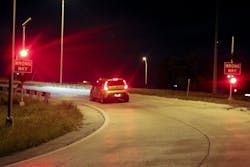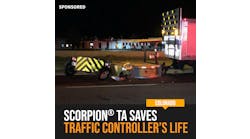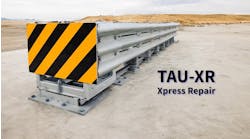Innovative traffic safety research from Florida State University (FSU), incorporating a fascinating mix of engineering and psychology, is being deployed on highways to save lives by targeting a deadly problem: wrong-way driving crashes.
Nationwide, wrong-way crashes kill about 350 people a year and injure thousands more, according to the National Highway Traffic Safety Administration (NHTSA).
Walter Boot, associate professor in the FSU Department of Psychology and an expert on cognition and perception, has compiled two wrong-way driving reports for the Florida Department of Transportation (FDOT). The research identifies “smarter” signs and pavement markers equipped with advanced technology that can improve safety. Boot’s recommendations will help shape future countermeasures for wrong-way driving. FDOT is currently testing those and other recommendations on the most effective safety measures. Boot started collecting that evidence as part of a contract with the FDOT following an unusual series of deadly wrong-way crashes in the Tampa Bay region in 2014.
Boot embarked on a multiyear research project drawing on his expertise in visual processing and visual cognition to test detection-triggered wrong-way signs and pavement markers. The goal was to identify “intelligent” technology that would better detect and prevent wrong-way driving and could be incorporated into new warning systems. Boot’s research team found that installing more countermeasures ahead of exit ramps helped, but additional warnings were needed to grab motorists’ attention once they started driving in the wrong direction. The next line of defense would be to install alerts that could cause wrong-way drivers to recognize their mistake, stop driving and turn around.
The team, working in collaboration with the Center for Urban Transportation Research at the University of South Florida and Florida International University, evaluated seven high-tech countermeasures. They included radar-triggered blank signs that immediately lit up when they sensed wrong-way motion, as well as bright beacons that flashed asynchronously.
Signs and pavement markers with other countermeasures proved to be the most effective countermeasures for impaired drivers.
---------
Source: Florida State University



